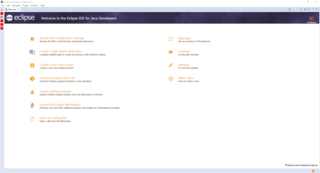Java Platform, Enterprise Edition, formerly Java 2 Platform, Enterprise Edition (J2EE), currently Jakarta EE, is a set of specifications, extending Java SE 8 with specifications for enterprise features such as distributed computing and web services. Java EE applications are run on reference runtimes, that can be microservices or application servers, which handle transactions, security, scalability, concurrency and management of the components it is deploying.
A web container is the component of a web server that interacts with Java servlets. A web container is responsible for managing the lifecycle of servlets, mapping a URL to a particular servlet and ensuring that the URL requester has the correct access-rights.

Apache Tomcat, often referred to as Tomcat Server, is an open-source Java Servlet Container developed by the Apache Software Foundation (ASF). Tomcat implements several Java EE specifications including Java Servlet, JavaServer Pages (JSP), Java EL, and WebSocket, and provides a "pure Java" HTTP web server environment in which Java code can run.

Eclipse is an integrated development environment (IDE) used in computer programming, and is the most widely used Java IDE. It contains a base workspace and an extensible plug-in system for customizing the environment. Eclipse is written mostly in Java and its primary use is for developing Java applications, but it may also be used to develop applications in other programming languages via plug-ins, including Ada, ABAP, C, C++, C#, Clojure, COBOL, D, Erlang, Fortran, Groovy, Haskell, JavaScript, Julia, Lasso, Lua, NATURAL, Perl, PHP, Prolog, Python, R, Ruby, Rust, Scala, and Scheme. It can also be used to develop documents with LaTeX and packages for the software Mathematica. Development environments include the Eclipse Java development tools (JDT) for Java and Scala, Eclipse CDT for C/C++, and Eclipse PDT for PHP, among others.
Model-driven architecture (MDA) is a software design approach for the development of software systems. It provides a set of guidelines for the structuring of specifications, which are expressed as models. Model-driven architecture is a kind of domain engineering, and supports model-driven engineering of software systems. It was launched by the Object Management Group (OMG) in 2001.
Web Services for Remote Portlets (WSRP) is an OASIS-approved network protocol standard designed for communications with remote portlets.

GlassFish is an open-source application server project started by Sun Microsystems for the Java EE platform and now sponsored by Oracle Corporation. The supported version is called Oracle GlassFish Server. GlassFish is free software, dual-licensed under two free software licences: the Common Development and Distribution License (CDDL) and the GNU General Public License (GPL) with the classpath exception.

ATL is a model transformation language and toolkit developed and maintained by OBEO and AtlanMod. It was initiated by the AtlanMod team. In the field of Model-Driven Engineering (MDE), ATL provides ways to produce a set of target models from a set of source models.

The Unified Software Development Process or Unified Process is an iterative and incremental software development process framework. The best-known and extensively documented refinement of the Unified Process is the Rational Unified Process (RUP). Other examples are OpenUP and Agile Unified Process.
The Java Persistence API (JPA) is a Java application programming interface specification that describes the management of relational data in applications using Java Platform, Standard Edition and Java Platform, Enterprise Edition.
OpenESB is a Java-based open-source enterprise service bus. It can be used as a platform for both enterprise application integration and service-oriented architecture. OpenESB allows you to integrate legacy systems, external and internal partners and new development in your Business Process. OpenESB is the unique open-source ESB relying on standard JBI, XML, XML Schema, WSDL, BPEL and Composite application that provides you with simplicity, efficiency, long-term durability, and savings on your present and future investments with a very low TCO.

OpenJPA is an open source implementation of the Java Persistence API specification. It is an object-relational mapping (ORM) solution for the Java language, which simplifies storing objects in databases. It is open source software distributed under the Apache 2.0 Licence.
Eclipse OpenJ9 is a high performance, scalable, Java virtual machine (JVM) implementation that is fully compliant with the Java Virtual Machine Specification.
EclipseLink is the open source Eclipse Persistence Services Project from the Eclipse Foundation. The software provides an extensible framework that allows Java developers to interact with various data services, including databases, web services, Object XML mapping (OXM), and Enterprise Information Systems (EIS). EclipseLink supports a number of persistence standards including:
In computing, Equinox is a sub-project of the Eclipse project that provides a certified implementation of the OSGi R4.x core framework specification. It is a module runtime that allows developers to implement an application as a set of "bundles" using the common services infrastructure.
Service Component Architecture (SCA) is a software technology designed to provide a model for applications that follow service-oriented architecture principles. The technology, created by major software vendors, including IBM, Oracle Corporation and TIBCO Software, encompasses a wide range of technologies and as such is specified in independent specifications to maintain programming language and application environment neutrality. Many times it uses an enterprise service bus (ESB).
The OSGi framework is a standardized module system and service platform for the Java programming language. The OSGi standards are defined in the OSGi Alliance and published in OSGi specification documents such as the Core and Compendium specifications. These specifications contain chapters each of which describe a specific OSGi standard. This page contains a list of available implementations of OSGi standards, both commercial and open source implementations are included.
Implementations realize specification chapter(s) from the OSGi specification documents.
Apache Aries, a Blueprint Container implementations and extensions of application-focused specifications defined by OSGi Enterprise Expert Group. The project aims to deliver a set of pluggable Java components enabling an enterprise OSGi application programming model. The Aries project Content includes the following:







